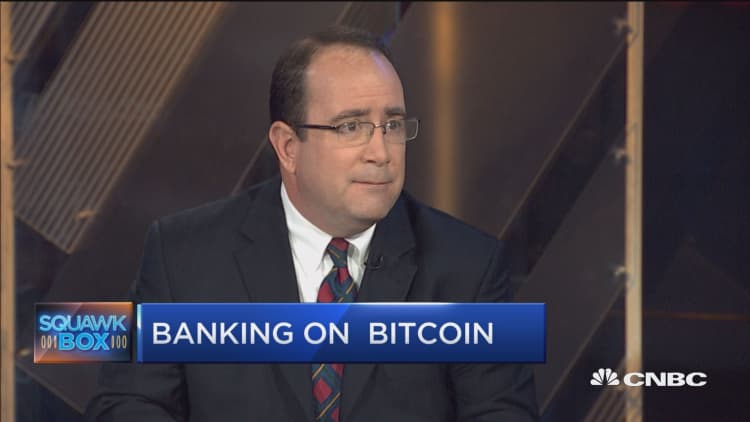JPMorgan Chase's chief executive, Jamie Dimon, is the most successful banker of his generation. He has successfully navigated a challenging environment over more than a decade, and his firm is stronger than ever.
So naturally, given his status and success, his recent comments that Bitcoin was a "fraud" were taken seriously.
Mr. Dimon's comments may have come as a surprise to the dozens of employees at his bank working on projects related to blockchain, the bookkeeping technology underpinning digital currencies. And the comments must have been especially jarring to those employees who were holding a forum for hedge funds interested in Bitcoin— whose market value stood at about $70 billion at that moment.
More from New York Times:
How the Fed is flexing its muscles as a banking regulator
Funding talks at Uber and Lyft complicate ride-hailing allegiances
Ranting and rapping online in China, and raking In millions
It's no secret that Bitcoin and other digital currencies may dramatically fall in value at any time. How can an asset whose value jumps by 20 percent some days, and which no one can accurately value, plausibly not also suffer huge declines?
But that's a long way from Bitcoin being a worthless fraud.
While we are still in the early stages of digital currencies, and much can still go wrong, Mr. Dimon's rationale for his negativity was curious. His core problem with Bitcoin? "You can't have a business where people are going to invent a currency out of thin air," he said.
Yet as one of the world's foremost bankers, Mr. Dimon is plainly aware that countries also create fiat currencies out of thin air. (In Latin, fiat means "let it be done.") It has been more than four decades since Richard Nixon removed the American dollar from the gold standard.
And in any event, most of gold's value doesn't arise from its physical attributes, since it doesn't have any magical ability to create usefulness or generate financial dividends despite its attractive shiny yellow hue. It's instead because investors have believed in its value for thousands of years.
Of course, fiat currencies like the dollar have the backing of a sovereign nation. Digital currencies are obviously far more speculative, have been around for only a few years, and don't have a government's underlying support. But almost all currencies today are conjured up from nothing — the euro didn't even exist 20 years ago — and their value is largely dependent on trust.
Naturally, most people have more trust in the "full faith and credit of the United States" than in an anonymous distributed group of miners and traders. But trust in digital currency is clearly building over time and is a self-reinforcing network. And one of the advantages of Bitcoin is that its total supply is fixed. A fiat currency, on the other hand, can be devalued by centralized monetary policy.
In his comments, Mr. Dimon cited the famed investor Howard Marks, who in a July memo to his clients referred to Bitcoin as an unfounded fad. But he seems to have missed Mr. Marks's subsequent backflip in which, while remaining a skeptic, the hedge fund mogul wrote, "There's absolutely no reason why Bitcoin — or anything else — can't serve as a currency if enough people accept it as such."
Mr. Dimon is also too modest about JPMorgan's own achievements in this arena. His firm conjured up its own currency: Chase Ultimate Reward points, its credit card loyalty program. Millions of customers have accumulated billions of points, trusting in Chase's promise that this currency can be converted into cash or used for travel and other delights. And they hope that Chase won't unilaterally choose to devalue them, while living with the risk that, unlike their bank accounts, the Federal Deposit Insurance Corporation provides no insurance for this valuable currency.
JPMorgan is even working on its own blockchain project, Quorum, which is built on the publicly accessible Etherereum network. Presumably, Mr. Dimon doesn't think Etherereum, whose value is up more than 2,000 percent over the last year, is also a modern version of tulip mania.
In Mr. Dimon's telling, Bitcoin has value only for people who want to bypass the traditional banking system for illicit purposes, including "murderers and drug dealers," or people living in countries with repressive governments like North Korea and Venezuela. He doubts that this is a large market opportunity, though perhaps he may concede that there are inherent difficulties in accurately sizing up markets where participants like to keep a low profile.
Part of the promise of the blockchain, and associated digital currencies, is the absence of a central authority. It's fair to say that the cult of decentralization may have run too far, with some enthusiasts imagining it as a panacea for every business problem. Centralized networks work well for many functions, like trading stocks or managing flight reservations.
But new use cases for digital currencies are just starting to take shape. They are now being used to create value in the way that Silicon Valley has traditionally done so: regulatory arbitrage. Ride-hailing got its start avoiding onerous taxi medallion costs; Airbnb avoided hotel taxes and regulations; and YouTube played fast and loose with copyright rules.
Similarly, some entrepreneurs are using the blockchain as a way to avoid certain regulatory requirements for raising capital. As a rule, Silicon Valley prefers to ask for forgiveness rather than permission.
Companies are also creating tokens to align incentives around decentralized efforts like open source software or distributed storage networks.
Undoubtedly, there will be plenty of hits and misses, as one would expect in the early days of a new technology. And there will be some outright scams as well.
But the toothpaste is now out of the tube, and there is sufficient momentum for legitimate use cases to develop. Presumably, that's why JPMorgan itself is investing resources in developing these technologies and applications.
Economists use the term "cheap talk" for words that don't have any payoff. Despite his withering Bitcoin critique, Mr. Dimon also said, "Don't ask me to short it. It could be at $20,000 before this happens, but it will eventually blow up."
Mr. Dimon added that he would fire any employee who traded Bitcoin. But he didn't say how he would deal with an employee who publicly identifies a $70 billion fraud — then doesn't find a way to make a dime out of it.
WATCH: Bitcoin depends on 'everything going right': Commonwealth Financial Network's Brad McMillan





